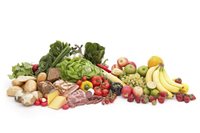Nutrition
 Nutrition and diet can be used to boost fertility, and is one of the most powerful health changes you can make.
Nutrition and diet can be used to boost fertility, and is one of the most powerful health changes you can make.
Numerous studies have shown that specific changes to the diet can improve fertility, prevent recurrent miscarriage and support a healthy pregnancy.
What you eat plays a big roll when it comes to having a healthy body and reproductive system. The building blocks for hormones are found in the foods we take in. Antioxidants, which help to protect the egg and sperm from free radicals, are found in the foods that we eat. Just as nutrients in food can be helpful for fertility, there are some foods and chemicals added to foods that can be harmful for your health and fertility.
Foods to eat on a Fertility Diet:
Eat a lot of organic vegetables and fruits
Conventional produce contains harmful herbicides and pesticides which have been shown to negatively effect both male and female fertility. Studies have also shown organic vegetables and fruits to have more nutritional value.
Eat organic, grass-fed, whole fat, raw dairy
Organic, grass-fed, whole fat, raw dairy is the best choice of dairy sources. Dairy that is not organic should be avoided as it contains added hormones and antibiotics which can contribute to increased oestrogen levels in the body. There are many healthy alternatives to dairy such as fresh almond or coconut milk.
Try to eat mostly cold water fish
Fish supplies important essential fatty acids (omega 3) to our diet. These fatty acids aid in the production of hormones, reduce inflammation, and help regulate the menstrual cycle. Focus on cold water fish such as wild Alaskan salmon and cod.
Choose meat that is Grass Fed and Organic
Conventionally raised cattle contain high levels of added hormones and antibiotics which can contribute to oestrogen dominate conditions, instead opt for grass fed organic meats.
Choose only free range/Organic chicken
Conventionally raised chickens are kept in unclean, cramped housing conditions and are fed non-organic and often, genetically modified feed. When shopping for chicken, look for the words “cage free”, “free range”, or “organic” on the label. Ideally purchasing your chicken from a local farm with free-range practices is best.
Eat only grains in their whole, natural form
Whole grains are filled with fibre, important vitamins, and immune supporting properties. Fibre is important for helping the body to get rid of excess hormones and helps to keep the blood sugar balanced. Avoid processed and refined white foods and grains such as white bread, semolina pastas, and white rice. Instead choose whole wheat or sprouted bread, whole wheat pasta, quinoa, and brown rice.
Eat high fiber foods with each meal
Fibre helps to regulate blood sugar levels which helps to reduce fertility issues such as PCOS, immunological issues, and promotes healthy hormonal balance. Some examples of high fiber foods are fruits, vegetables, dark leafy vegetables and beans.
No soy of any form unless fermented such as miso and tempeh
Soy foods have been shown to contain oestrogen mimicking properties. It is best to avoid processed soy such as soy milk, soy burgers, soy protein powder, soy chips, soy meats, and soy cheeses to avoid a negative impact on your hormonal balance.
Avoid refined sugars or fruit juices (unless freshly juiced)
Pasteurized juices such as bottled apple juice, orange juice, and other bottled fruit juices contain concentrated sugar, which can throw off your blood sugar levels and negatively effect your immune system. Also avoid any processed/refined and artificial sugars. Some great alternatives are stevia and honey.
Drink lots of clean water
Be sure to drink at least half your body weight in ounces of clean, purified or filtered water daily. It is best to avoid bottled water as some of the plastics in the bottle can contribute to hormonal imbalance due to their oestrogen mimicking chemicals.